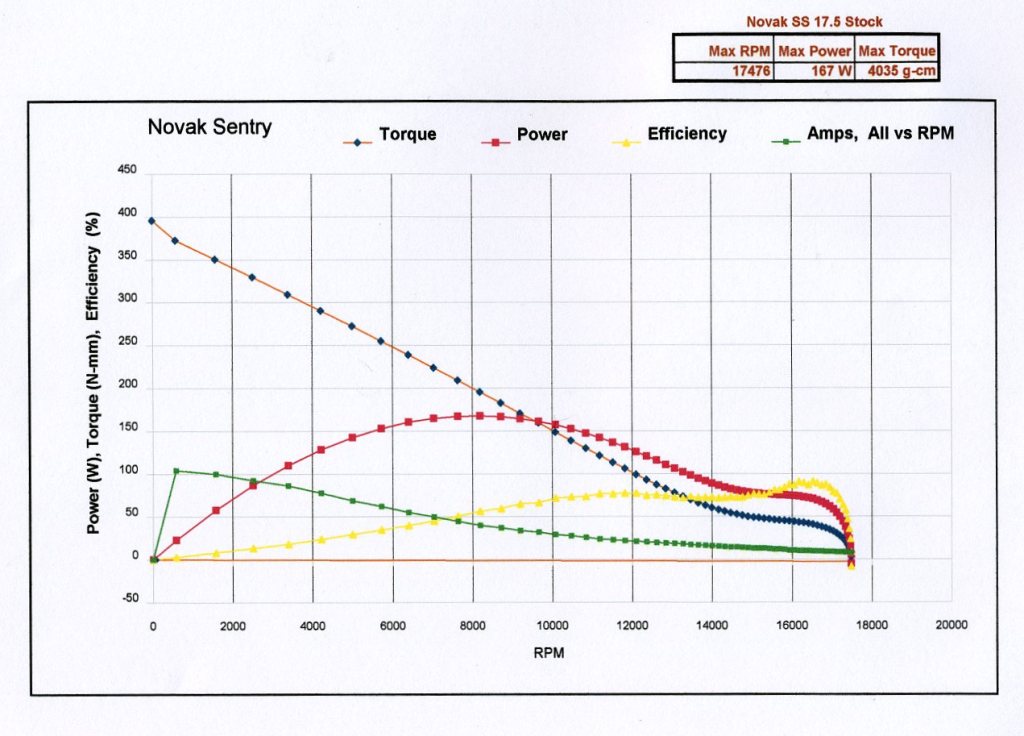kv versus torque
#2
less kv = more torque
another reason to run low kv motors is because of the efficiency of your system
the lower the kv, the higher the voltage needed to obtain the same rpm because:
v x kv = rpm
why do you want higher voltage?
power (watts) = intensity (amperage) x tension (voltage)
but the loss of energy (heat) is generated by the amperage
so for the same amount of power, you want the lower amperage possible, that means the higher voltage, which means the lower kv possible for the same rpm
another thing concerning the weight:
4s 5000mah = 5s 4000mah = 3300mah 6S
you'll get about the same runtimes, generally a little more with more cells for an equivalent weight
I get 10 minutes runtime on an outdoor track from a 1400kv 5S setup with a 5S 2200mah lipo weighting 298g in my buggy
The sweet spot is about 30 000rpm with the highest voltage possible. So from all the setups possible 6S 1400kv is about the best you can get.
6 cells = 6 x 3,7v = 22.2v
22.2v x 1400kv = 31 050rpm
I run a 5S because I'm a smooth driver and I run on slippery small to medium tracks. My temps are higher in 5S because I need to compensate with my motor pinion and gear it higher. But I don't need a fan on neither the motor or controller.
The other thing: you don't need batts with such an high C rating when you use more cells.
So if you run a low kv, you run high voltage. The one is related to the other. It will save your electronics (less amps needed), give you better runtimes and a lighter buggy too. If the ROAR knew anything about electricity (and I'm no pro), they would ask drivers to use 6S and not 4S.
another reason to run low kv motors is because of the efficiency of your system
the lower the kv, the higher the voltage needed to obtain the same rpm because:
v x kv = rpm
why do you want higher voltage?
power (watts) = intensity (amperage) x tension (voltage)
but the loss of energy (heat) is generated by the amperage
so for the same amount of power, you want the lower amperage possible, that means the higher voltage, which means the lower kv possible for the same rpm
another thing concerning the weight:
4s 5000mah = 5s 4000mah = 3300mah 6S
you'll get about the same runtimes, generally a little more with more cells for an equivalent weight
I get 10 minutes runtime on an outdoor track from a 1400kv 5S setup with a 5S 2200mah lipo weighting 298g in my buggy
The sweet spot is about 30 000rpm with the highest voltage possible. So from all the setups possible 6S 1400kv is about the best you can get.
6 cells = 6 x 3,7v = 22.2v
22.2v x 1400kv = 31 050rpm
I run a 5S because I'm a smooth driver and I run on slippery small to medium tracks. My temps are higher in 5S because I need to compensate with my motor pinion and gear it higher. But I don't need a fan on neither the motor or controller.
The other thing: you don't need batts with such an high C rating when you use more cells.
So if you run a low kv, you run high voltage. The one is related to the other. It will save your electronics (less amps needed), give you better runtimes and a lighter buggy too. If the ROAR knew anything about electricity (and I'm no pro), they would ask drivers to use 6S and not 4S.
Last edited by Pulse_; 01-09-2013 at 03:24 PM.
#4
Lower Kv motors (higher turns) do have higher torque at low RPMs only. But in practice a higher Kv needs lower gearing (smaller pinion, more reduction), so generally a high Kv-low turn provides more torque and power at the wheel at all speeds. A couple dyno charts for reference, compare a 17.5 turn (low Kv) to a 3.5 turn (high Kv).
A sample Novak SS 17.5 Stock graph:

A sample Novak 3.5 graph:

Chart credit to John Stranahan
Main reason to go to a lower Kv with the same battery voltage is to reduce the overall power level. To make the car more driveable with available traction, increase run time, reduce temps, etc. Or to fit into an existing stock or spec motor class of course.
A sample Novak SS 17.5 Stock graph:

A sample Novak 3.5 graph:

Chart credit to John Stranahan
Main reason to go to a lower Kv with the same battery voltage is to reduce the overall power level. To make the car more driveable with available traction, increase run time, reduce temps, etc. Or to fit into an existing stock or spec motor class of course.
Last edited by Dave H; 01-09-2013 at 05:47 PM. Reason: hopefully less confusing???
#5
these graphs are very interesting, thanks Dave 





